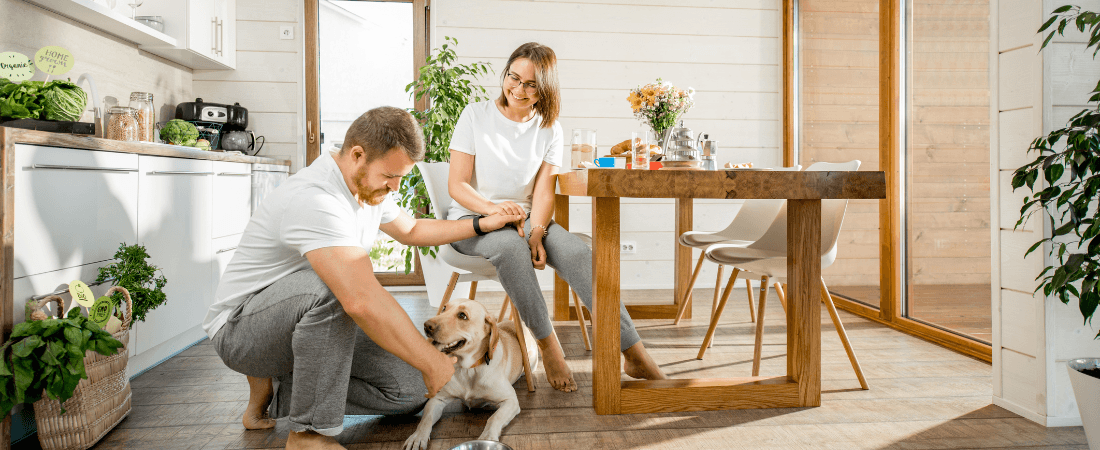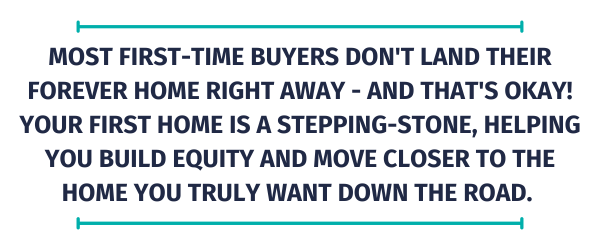We Don't Want Homeownership to Be Just a Dream
03/06/2025
By: Conor Moreau

Sometimes I like to give myself a little psychic damage by opening up Zillow and looking at the most expensive houses on the market in Maine. It can feel pretty impossible to buy a home in today's competitive market filled with high prices, higher interest rates, and less homes.
DON'T GIVE UP HOPE! The dream of owning a home is still possible; we just need to update our strategies to find the perfect fit within your budget.
We'll share insights to help you navigate today's market, manage the homebuying process, and make ownership more affordable.

Reality Check
It's not time to start scrolling and saving homes to your wish list yet. First - we need to put on our researcher hats.
Look at listings in your area and calculate the median home price. This can help you determine the middle of the current housing market. With the median price, you can compare against your budget and have a better understanding of the homes within your reach.
Many people strategically use their starter home as an opportunity to build equity – which can be used to make buying their forever home more affordable.
What Can You Afford?
We're not at the fun house hunting step JUST yet, first you need to figure out what can you ACTUALLY afford.
It's essential to understand how a mortgage payment will fit in with your current income, monthly bills, debt repayments, and the rest of your finances.
While online calculators can help you determine what's feasible for your budget, there are also two financial rules of thumb that assist in the process:
- Rule #1: Your maximum mortgage amount shouldn't exceed 2.5x your annual income.
Lenders use the 2.5x rule to initially gauge your price range. If you (and your spouse if you're married) earn a combined income of $150,000, your price range would be around $375,000 ($150,000 x 2.5). This figure is a good starting point when estimating a reasonable budget.
- Rule #2: Your mortgage payment shouldn't exceed 30% of your monthly budget.
Using your combined income of $150,000 from the previous figure, your monthly gross income would be $12,500. 30% of this figure is $3,750 – the maximum amount you should put toward housing expenses monthly.
It's crucial to remember that your monthly mortgage payment will likely include other costs, such as property taxes and homeowner's insurance.

Sooo What Are Our Options?
While house hunting can be exciting, the financial side of the homebuying equation can be a bit more confusing and stressful. There is a slew of mortgage options available, each with advantages and drawbacks. Factor in specialized loan programs, like First-Time Homebuyer options, VA Loans, FHA Loans, and the whole process can have you wondering how anyone ever buys a home!
Are you looking for a starter home that you will outgrow down the road? Or are you searching for your forever home? Depending on your plans, you can use mortgage loans to your strategic advantage.
For example, two of the most popular mortgages are Fixed Rate vs. Adjustable Rate.
- Fixed-Rate Mortgages: The interest rates are fixed and will remain unchanged throughout the life of your loan. This option is ideal if you favor consistent payments and plan to live in the house long-term.
- Adjustable-Rate Mortgages (ARMs): With an ARM, the first several years of your mortgage will typically include an introductory period with low, fixed rates. Afterward, the interest rate can adjust with the current market. For example, a 7/1 ARM will provide a 7-year lower-rate intro period. After seven years, the mortgage rate can adjust annually.
Not sure what’s the best mortgage for you? Check out our blog - First-Time Homebuyer? Find the Best Mortgage Options for You!

Keep Reaching for Your Dreams
Everyone has a dream home in their mind; maybe yours has a grand library, a big backyard to run around in, or it is in a prime location downtown. The market doesn't care about your dreams, so finding the PERFECT home that checks off all of your boxes can be tough when you're dealing with a restrained budget.
If you're struggling to find the right place, it might be time to rethink your must-haves versus nice-to-haves.
Most first-time buyers don't land their forever home right away - and that's okay! Your first home is a stepping-stone, helping you build equity and move closer to the home you truly want down the road. Stay flexible, focus on what matters most, and remember - homeownership is about progress, not perfection.

Cash Up Front
Even if you have stellar credit (if you don't have stellar credit, check out our previous blog: Easy Ways to Avoid Bumps in Your Credit Journey), there's one big hurdle that any first-time homebuyer faces and it isn't your monthly mortgage.
Between the down payment and closing costs, buying a home requires a significant chunk of cash before you even get the keys.
Down Payment: Depending on the mortgage you choose, down payments can range from 5% to 20% or more. To put those figures into perspective, let's use the $375,000 home from earlier. Your down payment would be between $18,750 and $75,000.
Down payment giving you pause? A CU Promise 97 Loan can massively minimize upfront costs for people with fantastic credit. It covers up to 97% of the sale price or appraised value, allowing you to make a much smaller downpayment.
Learn more about the CU Promise line on CUSO's website or by talking to one of our mortgage experts!
Closing Costs: This figure includes fees and costs associated with buying a home and contains prepaid property taxes and homeowner's insurance. Closing costs typically range between 3% and 6% of the home price. With our $375,000 house, that's an additional $11,250 to $22,500 due upfront.
Phew, okay, that's a LOT of money. It's normal to feel like those numbers put homeownership outside of your reach. But don't let the numbers discourage you - there are ways to break through this barrier. Start saving early, explore loan programs that offer lower down payment options, and research grants or assistance programs that can help lighten the load.
Looking for tips on how to adjust your budget to save extra money for your first home? Check out our previous blog: Empower Your Future: Invest In Yourself and Unlock Financial Freedom.
These upfront costs are much easier to manage when buying your forever home down the road. The income you make when you sell your starter home can be used to offset these costs – making future homes much more affordable.

HOME BUYER SEMINAR MARCH 19TH!!
Still have burning questions? Don't worry! Our mortgage experts, Erin and Jocelyn, can answer all your questions. Join us for our FREE Virtual Home Buyer Seminar on March 19th, where we'll help you gain confidence before you start the home-buying process.
TLDR: The journey to homeownership, though daunting due to high prices and financial requirements, is attainable with strategic planning and understanding of the market and mortgage options. By staying flexible in your expectations and focusing on building equity, homeownership can be a stepping-stone toward achieving your dream home in the future.
We're Here to Help!
If you want to work one-on-one with a mortgage specialist to determine the mortgage type that will work best for you, we're happy to help you. Our team is here to guide you through the entire homebuying process. Please stop by any of our convenient branch locations or call 800-834-0432 to schedule an appointment.
Stay up to date and join our email list.
The Atlantic blog strives to deliver informative, relevant, and sometimes fun financial information. If you enjoyed this article, please forward it to a friend.
Each individual’s financial situation is unique and readers are encouraged to contact the Credit Union when seeking financial advice on the products and services discussed. This article is for educational purposes only; the authors assume no legal responsibility for the completeness or accuracy of the contents.

